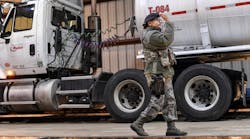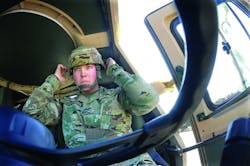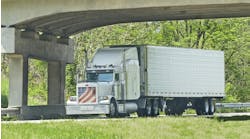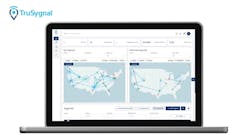There are two groups of truck drivers that have fewer accidents, drive more miles and stay in the same job longer: veterans and women. And thanks to federal initiatives to help veterans get jobs in transportation, we should start seeing more women vets piloting trucks on American roads.
Based on data it has been compiling for a decade, Omnitracs says women veterans would make for excellent truck drivers. And those women could find higher pay than the average salary garnered by the average female veterans in the private sector.
“Although women and veterans make up a smaller population in trucking, they are great truckers,” Lauren Domnick, Omnitracs’ director of data and analytics, told American Trucker this week.
According to the Omnitracs study, fewer than 9% of truckers are women. And 19% of all truckers have a military background.
While there are fewer women and veterans driving commercial trucks, those who are tend to be safer than the male truckers who didn’t serve in the military.
With driver retention a growing problem in the trucking industry, Omnitracs’ data shows that women veterans could help solve that problem because both women and veterans tend to stay at the same job longer. The same data shows that women and veterans are more likely to drive more miles and have fewer severe accidents than the average truck driver.
Looking at statistics gathered over the past 12 months (October 2016-September 2017) by Omnitracs, there was not one month that women truckers had a higher turnover rate than men.
There were only two months in the past year that female truck drivers had more severe accidents than men. Looking recent data from July, August and September 2017, women truckers have been behind the wheel for less than 0.1 accidents per 100 drivers; men have more than doubled that with 0.2 accidents per 100 drivers in the same period.
“We saw that women have significantly fewer rollovers and rear-end collisions, which are two very costly accidents for fleets,” Domnick said.
Women have also consistently driven more miles on average than male truckers over the past year. Two months (October 2016 and May 2017) in the past year, women averaged more than 7,500 miles -- an average that men never reached.
“I think it’s safe to infer that women are safer drivers in terms of both sever accidents and all accidents,” Domnick said. “That is what the trends indicate.”
These women trucker stats tend to mirror military veteran trucker stats, Domnick of Omnitracs said.
The Federal Motor Carrier Safety Administration wants to make it easier for veterans to get work in the transportation industry. Recent initiatives have cleared the path for veterans who drove large vehicles in the military to make it easier to get a commercial driver's license (CDL).
Recruiters and trucking companies, Domnick noted, are always looking for safe, productive drivers. “Women tend to be safer, have longer tenure and be more productive,” she said. “And veterans have the same trends.”





